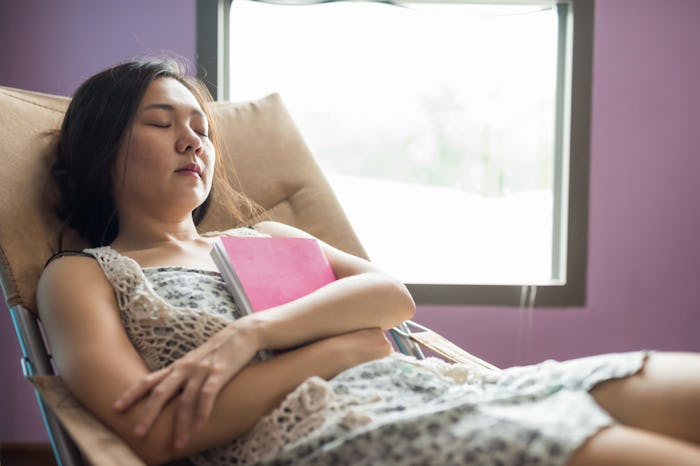Life

4 Surprising Times When You Shouldn't Nap, No Matter How Tired You Are
Kids don't know when they have it good. Your average 3- or 4-year-old sees a nap as something only less slightly repulsive than Brussels sprouts, while we grownups would sing hallelujah, do a victory dance, and run for the nearest couch if we were required to take a daily rest time. But much as we love any opportunity to sneak in a little shut-eye, there are actually times when napping isn't recommended for adults. Knowing the truth can help you plan the day (or the night, as the case may be) and make you aware of any signs of more serious problems.
Normally, taking a little snooze time during the day can be a good thing, not to mention something that comes naturally. The National Sleep Foundation explains that our bodies' circadian rhythms are set to make us feel tired in the afternoon, so many of us succumb to that urge. WebMD points to studies showing that napping has a number of benefits for adults, including bolstering memory, increasing alertness, boosting our mood, and improving our job performance (how many of us have wanted to campaign for putting a cot in the workplace?).
But there are some circumstances in which taking a nap may not be as beneficial as we think. For example, after an international flight, experts recommend combating jet lag not by napping right after landing, but by going to bed at the local time corresponding to the time you normally turn in. When else should you try to stay awake? The answers may surprise you.
After 3 p.m.
Giving your eyes a little rest when you get home from work, or stretching out to relax after dinner, may sound like a harmless and pleasant bit of luxury. And, in fact, occasional napping can be a healthy part of the day. In fact, the ideal window is post-lunch, between 2 to 3 p.m., according to the National Sleep Foundation. Any later than that, and napping can make it difficult to fall asleep at bedtime. If you find yourself wanting to nap in the afternoon because you're suffering from insomnia later at night, the foundation recommends talking to your doctor about possible causes and treatments. For example, anxiety and troubling thoughts can keep you from falling asleep, as can using your computer or phone late at night.
Before A Long Drive
Drowsy driving is a definite risk: It was responsible for nearly 800 deaths in 2017, according to the National Highway Traffic Safety Administration. The NHTSA and medical experts agree that you should always get off the road, preferably at a rest stop, when you feel drowsy, and take a 10-minute nap break. However, don't expect to be immediately refreshed and ready to go when you wake up. Research shows that our bodies go into a state called sleep inertia after a nap, during which we feel groggy, and our reaction time and motor abilities are impaired.
If you have a long road trip planned, you're better off getting a good night's sleep beforehand, rather than relying on a nap break to get you through. Or add an extra night's stop to your itinerary so you can start fresh the next morning. But if you can't avoid taking a snooze stop, give yourself some time to fully wake up afterward. Get up and walk around, take a good stretch, or get a cup of coffee, before hitting the road again.
When Naps Make You Feel Awful
For many of us, a 10- to 20-minute lie-down leaves us feeling refreshed and energized afterward. Others aren't so lucky. Psychologist and sleep expert Sara Mednick, Ph.D., told Time that a certain percentage of the population "wake up from naps feeling like crap." These tend to be the people who go into a deep sleep even during a short snooze, rather than a lighter sleep state. If you find that a brief period of shut-eye makes you feel groggy and disoriented, then that's a sign that you're not biologically wired for napping. Instead, focus your energy on getting a good night's sleep at bedtime.
When Napping Becomes A Habit
An occasional early-afternoon nap — after a good workout, or a very busy morning — can be rejuvenating. Ditto when you're down with the flu or a new mom adjusting to your baby's odd sleep habits. But if you find yourself relying on a snooze almost every day to stay alert, that could be a signal of future health problems, University of Arizona sleep researcher Michael Grandner, PhD, told Men's Health. Excessive napping has been linked to type 2 diabetes and cardiovascular disease, and may even increase your mortality risk. Napping an hour or more a day is particularly worrisome, he added. If you find that you frequently need a long rest period, talk to your doctor about the possible cause of your drowsiness.
After a very frustrating first birth experience, this Deaf mother wanted a change. Will the help of two Deaf doulas give the quality communication and birth experience this mom wants and deserves? Watch Episode Four of Romper's Doula Diaries, Season Two, below, and visit Bustle Digital Group's YouTube page for more episodes.